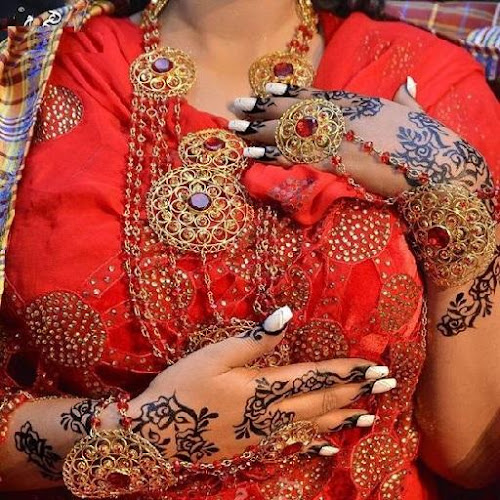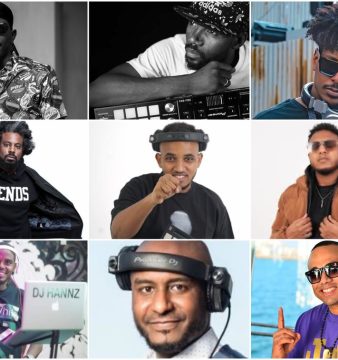4 Occasions When Sudanese Apply Henna

Henna is a vital part of Sudanese culture and social life. It is a popular and common beauty practice, playing a significant role in the lives of traditional Sudanese women. From weddings to celebrating a birth, henna is a celebratory beauty regiment with a long history in Sudan.
Before we get into it, here are a few things you should know about Sudanese henna:
- Sudanese henna is most commonly black henna, which is made by mixing para-phenylenediamine (PPD) with henna, a natural, plant-based dye. Although generally popular and safe, it is known to be poisonous and cause severe skin reactions. Other forms of henna is a based on the plant itself without PPD and dye. Although it is not black, it naturally becomes a dark shade of brown.
- Henna for married women differentiates from henna for unmarried women. Similar to the wedding ring, henna can symbolise a woman’s marital status. Married women decorate both their hands and feet with henna for any occasion. Traditionally, young women or girls (unmarried) apply henna only on a hand or two with a simple design not above the wrist. However, in recent years, young women or girls have begun to opt for a more elaborate and decorative henna on both hands extending to the elbow as well as henna on one ankle or both ankles. Unmarried women cannot apply henna on their feet; otherwise, it will signify that they are married.
- In Sudan, henna is also applied on men, but only during weddings and on young boys once they are circumcised.
- Henna, especially black henna, stays for approximately seven days or so. It may stay longer depending on maintenance – if soap or other washing or cleaning products as well as hand and body lotion are avoided.
- A woman who is adorned with henna is referred to as mahannana and a man is referred to as mahannan.
Weddings

Weddings are the most popular occasion and reason for women – and men – to have henna painted or drawn on their hands and feet. Henna is usually associated with weddings where everyone from the bride and groom to their families and guests can be found decorated with henna.
Married women: Whether they choose to apply henna for a wedding is a personal choice; however, it is expected if they are related or close to the bride or groom – unless they are grieving or in mourning. Furthermore, newly married women will opt for a more elaborate and decorative henna design on both their hands and feet.
Unmarried women: Young girls and women, especially those close to the bride and groom, will usually have henna on their hands.
Note: Weddings are the only occasion that Sudanese men, both married and unmarried, can be found decorated with henna – if they are close to the newly weds. However, men’s henna is basic without a design. It is simply pasted on their hands and legs to leave their hands in legs in a dark shade of brown, nearly black.
In celebration of Eid
The second most popular occasion when Sudanese women apply henna is during Eid – both Eid Al Fir and Eid Al Adha – as part of celebrating the holiday/s. Married women are most likely to do so than unmarried women/young girls. It is expected of married women, but not of unmarried women/young girls. It is applied before the first day of Eid so that she is completely adorned with henna for the holiday/s.
Celebrating a birth
Whenever a woman gives birth, it is expected that she takes the time to apply henna on her hands and feet. Women usually apply henna before their due date so that they are already completely adorned with henna before they give birth. As previously stated, in Sudanese culture, henna signifies joy and celebration.
Circumcision
Similar to Christianity and Judaism, male circumcision is a religious obligation in Islam, mainly to follow the sunnah (practice) of Prophet Muhammad (PBUH) ﷺ. Moreover, it as a contributor to personal cleanliness and hygiene. In Sudan, on the day of a young boy’s circumcision, a celebration takes place, which includes dressing him up in traditional clothing – similar to what he will wear on his wedding day – and applying henna on the young boy.
And When they don’t…
Funerals or during grief
It is frowned upon for women to apply henna for/during a funeral especially of a loved one. However, recently, there has been a new trend where women apply henna to mark their grief. It is a basic, simple henna. However, it is still unpopular and generally disapproved of.
The holy month of Ramadan
Although it is not frowned upon, women rarely apply henna during the holy month of Ramadan due to the holiness of the month. However, if one decides to apply henna during Ramadan, it is not taboo.




